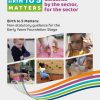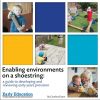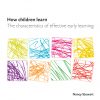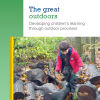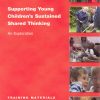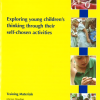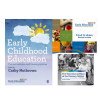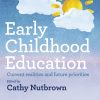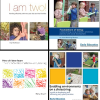Today, Friday 17 May, the Early Education and Childcare Coalition (EECC) has launched its new manifesto, with proposals to rescue and reform England’s early education and childcare sector. Early Education are one of the 30 organisations in the coalition which brings together representatives of parents and children, practitioners, providers, employers and the business sector.
To support the launch of the manifesto, the Coalition has released new research undertaken by More in Common looking at the importance of childcare reform to voters in England. The research underlines the overwhelming feeling that no child should have to miss out on early education due to family circumstances, with data showing that seven in ten voters (71%) think children should have a right to access early education and childcare regardless of their parents’ employment status.
Under current plans to expand childcare support, only children whose parents work a minimum of 16 hours per week are entitled to the new 15 and 30 hours offer being phased in. The Institute for Fiscal Studies previously found that the poorest third of children would get no direct benefit from the current planned expansion. Last month, the National Audit Office (NAO) also raised concerns about the potential for the current expansion to widen the educational attainment gap between the poorest children and their peers.
Today’s research also shows that all segments of voters – whether they have young children or not – recognise the importance of the early years, with two-thirds of voters (67%) believing that investing in early education and childcare benefits the whole country, not just parents – this is up from 59% last year.
Two-thirds (67%) of voters meanwhile think increased government funding in early education and childcare would improve the life chances of children, with 73% of voters saying that increasing government funding to providers would enable them to offer more places for children.
Current plans to expand the existing 30-hour offer means more children are eligible for government-funded places in early education, however low funding for those places means many providers are unable to offer the new entitlements, or recruit the staff required to meet demand.
The new Rescue and Reform manifesto highlights three key priorities for the next government, including guaranteeing that all children can access inclusive, high-quality provision that’s affordable for parents. Today’s data reveals that half of voters (53%) are concerned about the availability of early education and childcare in England, with 40% saying it’s difficult to find provision and 49% saying it is unaffordable.
The polling also found a growing recognition among voters about the importance of the first years of life with around half (49%) saying our experiences before the age of five shape the rest of our lives, and 62% thinking it at least shapes the rest of childhood.
The manifesto’s other priorities include a call for sustainable and fair funding for all types of providers, and a new early years workforce strategy – something the EECC has been calling for as part of the current expansion. Today’s polling shows that the public is aware of the staffing challenges facing the sector with over half of voters (53%) feeling the number of early education and childcare professionals is too low.
The NAO’s recent report also highlighted the shortage of staff in the sector, while recent research by the EECC and University of Leeds found that 57% of nursery staff and 38% of childminders were considering quitting the sector this year. When this turnover is modelled against increased demand, as many as 100,000 more staff could be required to meet the additional demand and counter the high turnover.
The EECC’s manifesto also calls for the creation of an independent National Early Education and Childcare Commission to assess, design and implement recommendations regarding the current system. This is alongside a call for a funding review body to be established within five years in order to undertake transparent annual reviews of funding rates, again making recommendations to the Government.
Early Education Chief Executive, Beatrice Merrick, said:
“The Coalition’s manifesto shows that a diverse group of early years stakeholders can come together and agree on constructive ways forward that address our key shared concerns. These include ensuring that all children benefit from high quality early childhood education, especially those for whom it can be most transformative. We must ensure the additional investment in the sector is directed to where it can be most effective in supporting children and families, and used to strengthen the sector through carefully targeted reforms.”

